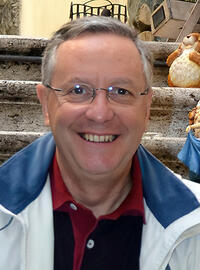The Cultural Advisory Council Welcomes Brazil
The Cultural Advisory Council Welcomes Brazil
By Marcos Dalmolin, São Paulo, Brazil
It was an honor to be invited to join Urantia Foundation’s Cultural Advisory Council, and I consider this position to be of great importance. 1) I value learning more about Urantia Foundation and its projects so that I can share this information with readers here in Brazil. Many local readers are unaware of the scope of the Foundation’s work, and that it goes far beyond printing books and publishing translations. 2) Being in contact with other readers from different cultures adds a new perspective to our activities here. It is helpful to learn what they are doing in relation to the experience of the teachings and dissemination of The Urantia Book.
My presentation to the expanded board of trustees was given in April, in which I reviewed a myriad of cultural, economic, and religious issues relevant to the future of The Urantia Book and its teachings in Brazil. Following are some of the points I shared.
I represent Brazil, the largest country in all Latin America. It is the world's fifth-largest country by area, and its sixth most populous. Unlike the rest of South America, we speak and read Brazilian Portuguese.
Brazil is a multicultural and ethnically diverse nation, due to over a century of mass immigration from around the world. About five million people from over 60 countries migrated to Brazil between 1808 and 1972, most of them from Portugal, Italy, Spain, Germany, Ukraine, Poland, Russia, China, Japan, Syria, and Lebanon.
Most of our population is Roman Catholic. However, in the last 10 years Protestantism, particularly Pentecostalism and Evangelicalism, has spread throughout Brazil, while the proportion of Catholics has dropped significantly.
Recently, I was elected to the position of vice president of Urantia Association of Brazil (UAB). Over the past two years, UAB has been building an infrastructure to serve a growing community of readers. This includes a website, database, publications, communication channels, 409 YouTube presentations, WhatsApp groups, and the launch of Radio Urantia Brazil.
Urantia Foundation can help local groups of volunteers such as UAB by providing information, getting to know their cultures, and encouraging their work. I also believe the Foundation should encourage affiliates to have clear objectives.
I envision a united Urantia movement with strong leadership that can provide support and guidance for individual or collective efforts. And I would like to encourage all countries to share their best practices regarding the formation of study groups and dissemination of the revelation.
